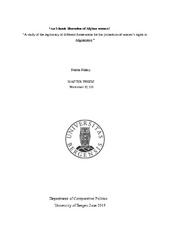| dc.description.abstract | This thesis addresses the question of what constitutes the basis rights of Afghan woman, in the area of matrimonial law. By covering the narratives of gender promotion in Afghanistan, with the aim to examine the effectiveness of employing a secular, western framework vs. an Islamic framework of rights. It examines the rhetoric of saving Afghan women as a component to justify military invasion, by mapping the context of women’s rights advocacy in the post-Taliban era. It follows with an attempt to create a historical contextual frame, in which the normative debate on divergent approaches to women’s rights advocacy is placed. The spectrum of approaches of the gender question in Afghanistan, is further linked to the wider debate in the Muslim world on which frameworks of rights hold legitimacy in the advocating egalitarian rights for Muslim women. The normative discussions are based on a qualitative study conducted in Afghanistan in May 2019, with the aim to identify Afghan women’s views on the basis of their rights, the legitimacy of state law and obstacles to obtaining their rights. The study finds that Afghan women, from rural and urban areas, understand Islam as the basis for their inherent rights, whilst seeing no contradiction between Afghan law and Islamic law. Whilst revealing a low degree of knowledge on both legal frameworks, respondents exhibit a clear understanding on what constitutes their rights as women, also identifying education, culture and poverty/security as the obstacles to their rights. This thesis sheds light on Afghan women’s own perceptions on their rights, contributing to link qualitative data to normative discussions on the advocacy of women’s rights in Afghanistan. To preserve hard-earned gains since 2002, the study recommends a holistic approach to the advocacy of women’s rights, moving beyond the simplistic contestations of the effectiveness of different frameworks to promote women’s rights in Afghanistan. | en_US |
